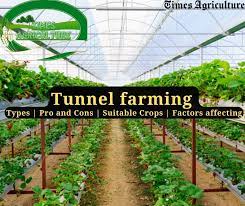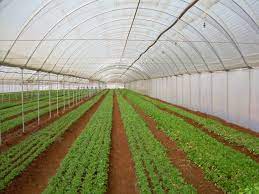


Tunnel farming has been around in South Africa for almost 4 decades. In the 70’s it was found that vegetables could be successfully grown without soil by using nutrient based solutions. Furthermore, great success was achieved by covering the plants with a plastic-clad semi-circular structure, dubbed a “tunnel”.
Tunnels may also be called, high hoops, high tunnels or poly tunnels. Tunnels are some times confused with “greenhouses”. The key difference is that tunnels are not heated and provide less climate control and are also less expensive. In South Africa, heating is not as critical as other climates such as in European countries. This immediately gives tunnel farming a competitive advantage over establishment costs.
There are many advantages to using this method of cultivating plants. The plants are grown in plastic tunnels in a growth medium other than natural soil. The plants get a constant flow of nutrients as they are dissolved in the irrigated water system thus creating large and high quality crops.
ADVANTAGES OF TUNNEL FARMING:-
-
High quality products.
-
No soil is needed.
-
Plants get a constant supply of nutrients through an automatic irrigation system.
-
Able to produce larger yields of vegetables on a small area of land.
-
Soil borne diseases are reduced or eliminated.